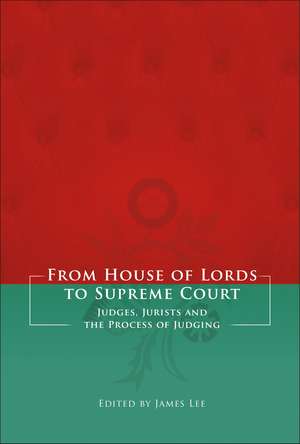From House of Lords to Supreme Court: Judges, Jurists and the Process of Judging
Editat de James Leeen Limba Engleză Hardback – 5 ian 2011
Preț: 568.05 lei
Preț vechi: 660.52 lei
-14% Nou
Puncte Express: 852
Preț estimativ în valută:
108.71€ • 114.00$ • 90.65£
108.71€ • 114.00$ • 90.65£
Carte tipărită la comandă
Livrare economică 07-21 ianuarie 25
Preluare comenzi: 021 569.72.76
Specificații
ISBN-13: 9781849460811
ISBN-10: 1849460817
Pagini: 312
Dimensiuni: 156 x 234 x 27 mm
Greutate: 0.64 kg
Editura: Bloomsbury Publishing
Colecția Hart Publishing
Locul publicării:London, United Kingdom
ISBN-10: 1849460817
Pagini: 312
Dimensiuni: 156 x 234 x 27 mm
Greutate: 0.64 kg
Editura: Bloomsbury Publishing
Colecția Hart Publishing
Locul publicării:London, United Kingdom
Notă biografică
James Lee is a Lecturer in Law at the University of Birmingham. In 2010 he was elected to a 3-Year Academic Fellowship of the Honourable Society of the Inner Temple.
Cuprins
1 Introduction JAMES LEE2. A Darwinian Reflection on Judicial Values and Appointments to Final National Courts M ICHAEL KIRBY3. From Appellate Committee to UK Supreme Court: Independence, Activism and Transparency AILEEN KAVANAGH4. Taking Women's Property Seriously: Mrs Boland, the House of Lords, the Law Commission and the Role of Consensus E LIZABETH COOKE5. 'Inconsiderate Alterations in our Laws': Legislative Reversal of Supreme Court Decisions JAMES LEE6. (Dis)owning the Convention in the Law of Tort JENNY STEELE7. Keeping Their Heads Above Water? European Law in the House of Lords ANTHONY ARNULL8. The Development of Principle by a Final Court of Appeal in Matters of Private International (Common) Law ADRIAN BRIGGS9. The Law of Unjust Enrichment in the House of Lords: Judging the Judges GRAHAM VIRGO10. Use of Scholarship by the House of Lords in Tort cases KEITH STANTON11. Judges and Academics: Features of a Partnership ALEXANDRA BRAUN12. Does Advocacy Matter in the Lords? ALAN PATERSON13. Close Calls in the House of Lords BRICE DICKSON
Recenzii
...a very useful set of essays that engage with the constitutional role of the House of Lords/Supreme Court (as well as its international peers) and the processes of the court, as well as investigation of the role of the court in some substantive areas of law....There is a great deal of interesting and varied material here to dip in and out of and the book certainly repays reading.
The twelve contributions in this volume are diverse in their themes and opinions but uniformly the contributions are stimulating and interesting and alike in the high quality of their analysis. This book will be of great value to anyone interested in the workings of the old Lords and the new Supreme Court.
This book is a joy and a gem, being a collection of inspired, inspiring, certainly thought provoking and often controversial papers delivered at a significant event held in 2009.You could also regard this book as a handy research tool, with its extentsive tables of cases and of legislation - some of it from other jurisdictions - and the invaluable index.Suffice to say that the book more than achieves its stated aim: 'to reflect upon the jurisprudence of the House of Lords and to consider the prospects for judging in the new Supreme Court.'
this book provides a great deal of insight into contemporary developments in British law-and especially in light of the growing interaction of European law with the domestic common-law tradition. It is a book of interest for scholars of British and European law, but it also illustrates, from within the councils of contemporary British legal thought, a central aspect of British legal and political concern about Europe and the European Union. Editor Lee, the Society of Legal Scholars and the publisher can be proud of this finely crafted, balanced and intricately detailed volume.
The twelve contributions in this volume are diverse in their themes and opinions but uniformly the contributions are stimulating and interesting and alike in the high quality of their analysis. This book will be of great value to anyone interested in the workings of the old Lords and the new Supreme Court.
This book is a joy and a gem, being a collection of inspired, inspiring, certainly thought provoking and often controversial papers delivered at a significant event held in 2009.You could also regard this book as a handy research tool, with its extentsive tables of cases and of legislation - some of it from other jurisdictions - and the invaluable index.Suffice to say that the book more than achieves its stated aim: 'to reflect upon the jurisprudence of the House of Lords and to consider the prospects for judging in the new Supreme Court.'
this book provides a great deal of insight into contemporary developments in British law-and especially in light of the growing interaction of European law with the domestic common-law tradition. It is a book of interest for scholars of British and European law, but it also illustrates, from within the councils of contemporary British legal thought, a central aspect of British legal and political concern about Europe and the European Union. Editor Lee, the Society of Legal Scholars and the publisher can be proud of this finely crafted, balanced and intricately detailed volume.
Descriere
This book examines the interaction between judges, academics and the professions in their task of interpretative development of the law.
